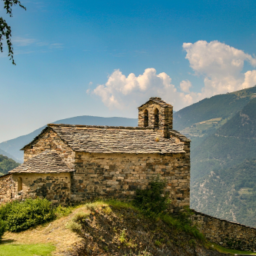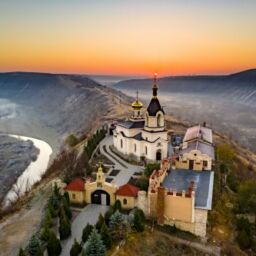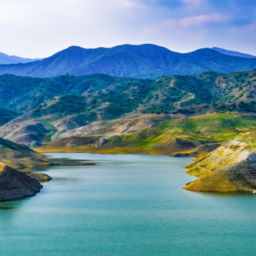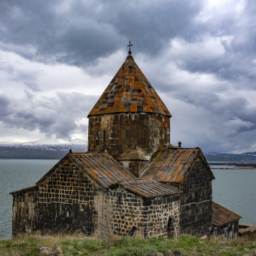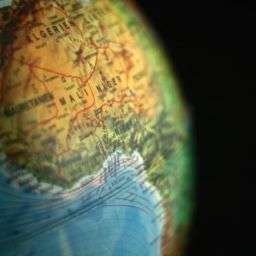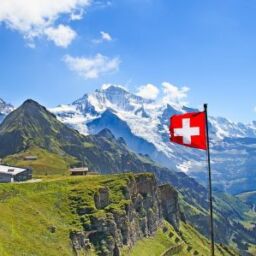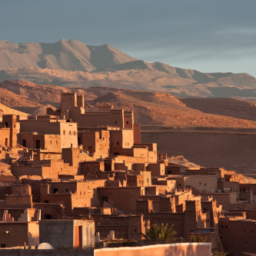

The Balkans, particularly Bulgaria, is a popular tourist destination both among young people and pensioners. Its warm sea, sandy beaches, hearty cuisine, budget-friendly prices, and familiar culture lure travellers wishing to rest and enjoy the summer.
At first glance, the Bulgarian language may resemble other Slavic languages. However, if you have learned Polish, Ukrainian, or Russian, you will notice that the grammar differs significantly. Let’s discover Bulgaria from a different, linguistic perspective.
An introduction to Bulgaria
Bulgaria’s long history dates back to ancient times, witnessing numerous cultures such as Thracian, Roman, and Byzantine on its territory. In the 9th century, the country became the cradle of Slavic Christianity, thanks to the missionary work of Saints Cyril and Methodius. From 1396, for over 500 years, Bulgaria fell under Ottoman occupation. Its declaration of independence, in 1878, was not the end of the challenges but the beginning of Russian and German influences clashing in the region. During World War II, the country sided against the Allies, joining the Axis powers.
Today, Bulgaria’s demographic landscape is diverse, with Bulgarians comprising about 85% of the population. There are numerous ethnic minorities; the most populous of them being Turkish, Roma, Russians, Greeks, Albanians, and Macedonians. The dominant religion of the country is Orthodox Christianity, but Islam also has many believers.
What language is spoken in Bulgaria?
The official language of Bulgaria is Bulgarian, which belongs to the South Slavic language group. Other languages used by national and ethnic minorities include Macedonian (considered by some linguists as a dialect of Bulgarian), Turkish, Romani, and Albanian.
Big international projects need different measures. If you wish to save time and funds, consider working with Skrivanek translation agency. Cooperation with experienced Croatian, Slovenian, Macedonian, and Bulgarian translators has never been so easy.
The Bulgarian language
About 7 million people speak Bulgarian in Bulgaria (source: tilti.co.uk), as it is the only official language of the country. Outside its borders, it is also used by emigrants living in Greece, Serbia, North Macedonia, Moldova, Romania, Canada, the United States, Turkey, and Ukraine.
History of the Bulgarian language
The history of the Bulgarian language is divided into three stages called Old Bulgarian (9th–11th centuries), Middle Bulgarian (12th–16th centuries), and Modern Bulgarian (16th century to the present). Linguists point to the contemporary presence of some words from the Proto-Bulgarian language (7th–10th centuries), such as бъбрек (“kidney”), куче (“dog”) and кумир (“idol”) as an interesting fact.
The most significant changes shaping the current Bulgarian language occurred between the 12th and 14th centuries. These transformations mainly involved the disappearance of declensions and infinitives, the introduction of prepositional constructions, and the appearance of articles. The vocabulary evolved over the years, with Greek and Turkish influence on the language.
Bulgarian phonetics
The Bulgarian word stress is dynamic, falling on any syllable depending on the word. Some words differ in meaning solely due to the accented syllables. For example, the word кoлá means cart, while кóлa means a sheet of paper.
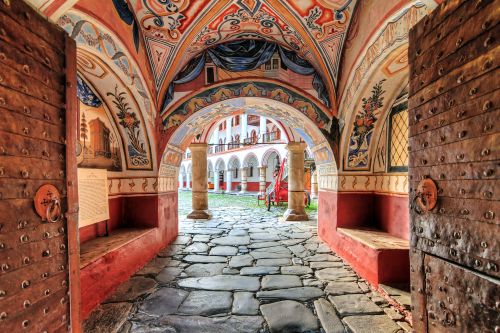
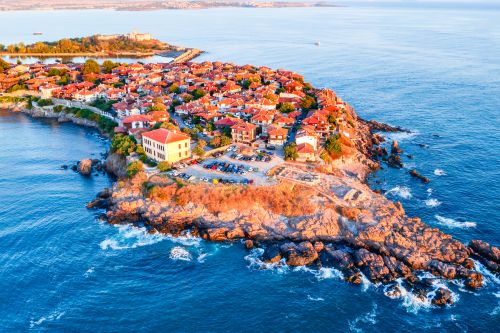
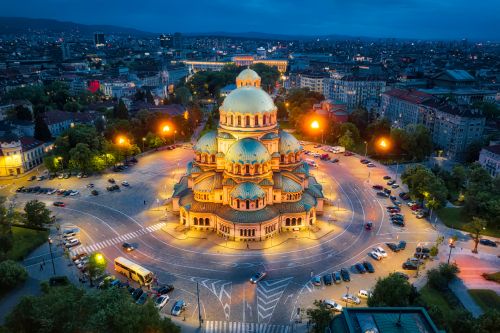
Bulgarian grammar
Modern Bulgarian has three noun genders: masculine, feminine, and neuter. They appear in singular and plural forms. Definite articles, unlike in Spanish or Italian, are attached to noun endings. Verbs are used in relative and absolute tenses (actions ongoing at a given moment or up to the moment of speaking). There are nine tenses in total.
Is Bulgarian similar to Russian?
Although both Bulgarian and Russian are Slavic languages, they are not mutually intelligible. A look at their most important features will help you get a grasp of the similarities and differences between them:
- Alphabet: Both languages use Cyrillic script, but some letters differ, e.g. Bulgarian Ъ ъ (“a”) and Ь ь (“y”) are not present in Russian.
- Grammar: Bulgarian generally does not have grammatical cases, while Russian has six. Instead, it uses indicative prefixes, which Russian lacks.
- Sentence structure: Both Bulgarian and Russian predominantly follow the SVO (subject–verb–object) structure.
- Vocabulary: Many words in Bulgarian and Russian share a common Slavic root. That is why some words appear very similar or even identical. However, as the languages evolved, their vocabularies diverged increasingly.
Furthermore, pay attention to non-verbal communication, which can be deceiving for foreigners. Shaking your head from side to side signifies disagreement in most of Europe, but agreement in Bulgaria.
Note: Due to its origin and being part of the South Slavic language group, Bulgarian is more closely related to Serbian, Croatian, Slovenian, and Macedonian than Russian.
English–Bulgarian mini phrasebook
In preparation for your trip, learn a few essential phrases that will help you get around. You never know when you might need them, so try to memorise as many as you can before your journey:
- Здравей (Zdravej) – Hello
- Добро утро (Dobro utro) – Good morning
- Добър ден (Dobăr den) – Good day
- Добър вечер (Dobăr večer) – Good evening
- Лека нощ (Leka nošt) – Good night
- Благодаря (Blagodarja) – Thank you
- Моля (Molja) – Please
- Извинете (Izvinete) – Excuse me / Sorry
- Говорите ли английски? (Govorite li anglijski?) – Do you speak English?
- Как си? (Kak si?) – How are you?
- Как се казваш? (Kak se kazvaš?) – What is your name?
- На колко години си? (Na kolko godini si?) – How old are you?
- Откъде си? (Otkăde si?) – Where are you from?
- Аз съм от Великобритания (Az sam ot Velikobritaniya) – I am from the UK
- Къде е тоалетната? (Kăde e toaletnata?) – Where is the toilet?
- Колко струва? (Kolko struva?) – How much does it cost?
- Мога ли да получа сметката? (Moga li da poluča smetkata?) – Can I have the bill, please?
- Наздраве! (Nazdrave!) – Cheers!
- Имам нужда от помощ (Imam nuzda ot pomošt) – I need help
A month might not be enough to learn Bulgarian from scratch, but it is just enough time to gain more confidence in speaking English. If you wish to break the language barrier and communicate freely while travelling, browse through our language courses.
Turkish language in Bulgaria
It is estimated that around 700,000 people speak Turkish in Bulgaria, accounting for 9% of the country’s population (source: tilti.co.uk). The Turkish constitute the largest ethnic minority in Bulgaria. Most of its members are descendants of settlers who arrived during the Ottoman conquests in the late 14th and early 15th centuries.
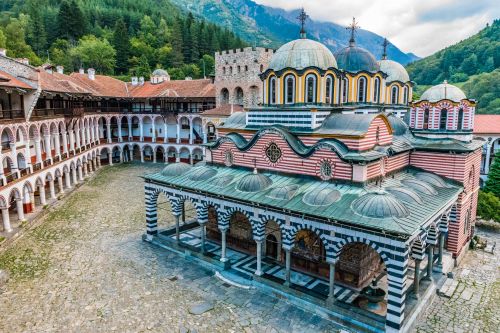
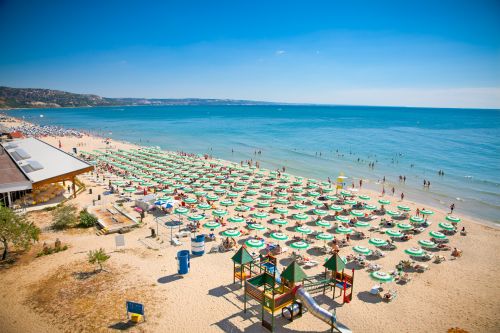
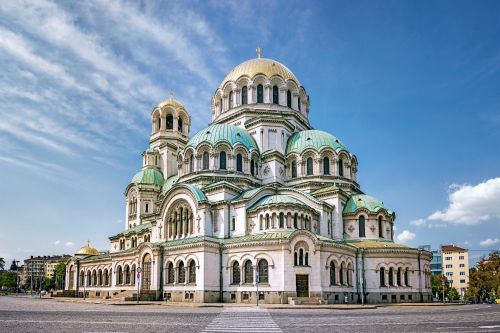
Romani language in Bulgaria
The Roma are the second-largest ethnic minority in terms of its size. They are descendants of nomads who came from India via the Dardanelles and Bosporus straits, either in the late 13th century or after the Balkans were conquered by the Ottoman Empire in the late 14th and early 15th centuries. Currently, around 69,000 people in Bulgaria speak Romani (source: tilti.co.uk).
Other languages in Bulgaria
Other languages in Bulgaria include Russian, Armenian, Romanian, and Greek. Many people, particularly the younger generation, learn English to get better employment. It is estimated that about 1.74 million people are fluent English speakers (source: tilti.co.uk). German is also a popular choice.
Have you offered language courses to your employees and want to check if they proved effective? Do not judge skills solely based on participants’ opinions: use the Focus Audit Tool, a measurable software that provides a detailed report on exam results. Check over 30 languages available, Bulgarian and Turkish included.
What to do in Bulgaria?
Here is our truly subjective list of the most interesting places in Bulgaria:
- The St. Alexander Nevsky Cathedral in Sofia is one of the largest Orthodox cathedrals in the world and a symbol of the country’s capital. It was built to honour the Russian soldiers who fought for Bulgaria’s liberation from the Ottoman rule.
- Plovdiv, Bulgaria’s second-largest city, is one of the oldest towns in Europe. Travel there to admire historical landmarks from various eras, including the Roman and Byzantine periods.
- The Rila Monastery is the largest and most important Bulgarian monastery, located in the Rila Mountains, some 120 kilometres south of Sofia. Enter the building to admire medieval frescoes and icons.
- Varna is a must-visit place for absolute relaxation. The warm Black Sea, numerous beaches, parks, and tourist attractions, such as the aquarium and dolphinarium, await solo travellers and families with children.
- The Great Mosque in Shumen, built in 1744, offers a chance to observe Ottoman architecture and spot numerous Turkish influences on local culture.
- Pirin National Park, located in the mountains, provides an opportunity to observe many endangered species, including the brown bear. If you want to see Vihren, Bulgaria’s second-highest peak, include it on your list.
- The Rila Lakes consist of seven glacial lakes situated at an altitude of 2100–2500 meters above sea level. Their beauty is worth a long hike, but if you are not a fan of walking or have limited time, just take the cable car.
You are almost set for the journey. We have equipped you with all sorts of interesting facts about the languages spoken in Bulgaria, introduced you to essential phrases, and highlighted must-visit places. It is time to pack your suitcase and hit the road! Take advantage of the flights to Varna, Burgas, or Sofia from almost any country in Europe.

